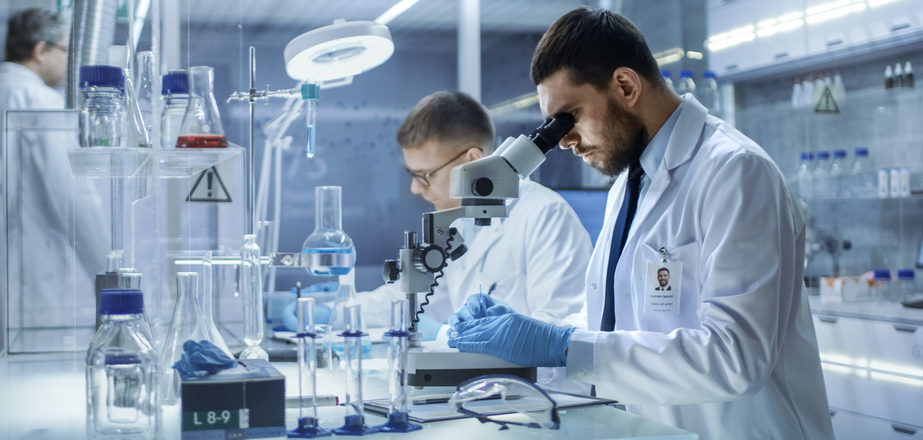In this section we will introduce some of the researchers from the Autonomous University of Barcelona which are currently working in BorderSens. In future issues we will introduce the rest of partners involved in the project.
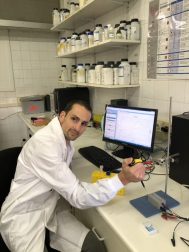 Hi everyone, I’m Xavier Cetó and I’m currently working as a researcher in the BorderSens project at the Autonomous University of Barcelona (UAB) in the Sensors and Biosensors group.
Hi everyone, I’m Xavier Cetó and I’m currently working as a researcher in the BorderSens project at the Autonomous University of Barcelona (UAB) in the Sensors and Biosensors group.
My academic background is in Chemistry from which I completed the BSc at UAB, and later on I also obtained both my MSc and PhD in Analytical Chemistry at this same university.
Our main task in the project is related to the data analytics and the application of electronic tongues approaches to the current project, which is our main research topic. The idea behind this concept is to exploit the synergies between sensors and chemometrics to infer underlying relationships between the measured analytical signals and the chemical properties of the samples. However, given our experience in modification of electrodes when developing multisensory arrays and in MIP synthesis and integration within electrochemical sensors, we are also involved in the development of electrochemical sensors and carrying out the voltammetric measurements.
I’m very glad to have had the opportunity to join such an interesting and challenging project, which will allow us to interact with excellent and highly motivated researchers from other universities, but also from the different end-users. I’m really looking forward to making a significant contribution to BorderSens by helping all the excellent researchers involved in this project.
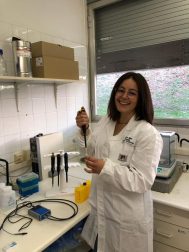
Hi everyone! I’m Marta, one of the PhD students from UAB involved in the BorderSens project. Graduated in Chemistry and specialized in Industrial and Environmental field in 2015, I decided to start my chemistry work experience by enrolling in the Industrial Chemistry and Introduction to Chemical Research master’s degree. The master’s degree allowed me to start my investigation career in an analytical development department from a pharmaceutical company. This experience inspired me to continue in the research field starting a PhD in chemistry in the Sensors and Biosensors Group. The main topic of my doctoral thesis is the development of voltammetric biosensors based on graphene platforms for their implementation in (bio)electronic tongues.
Thanks to my background, I have had the opportunity to join BorderSens, which is not only a scientifically interesting project but will also has a great impact on daily life. I am willing to work in international cooperation, and to learn from more experienced and excellent researchers. I am sure that together we will achieve the challenging and ambitious goals proposed in the project.
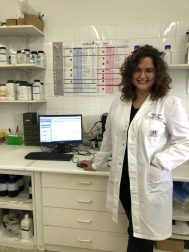
Hi all! My name is Dionisia Ortiz Aguayo. I finished my bachelor studies in 2014 in Chemistry, specialized in Industrial and Environmental Chemistry and I am currently a PhD student at the Sensors and Biosensors Group (GSB) in the Analytical Chemistry Department from the Autonomous University of Barcelona (UAB).
I started to work in the Analytical Chemistry Department in 2015, performing the master’s degree in Industrial chemistry and Introduction to chemical research at UAB. The project was focused on the development of biosensors using aptamers as (Bio)recognition elements and Electrochemical Impedance Spectroscopy (EIS) as the electrochemical technique to characterize them.
One year after, I started my PhD focused on two main topics: electrochemical sensors and Chemometrics. The key point in the research is to combine new modified sensor arrays systems with machine learning strategies for the detection of drugs of abuse and pharmaceutical products.
To achieve it, in 2019 I performed a research stay in the AXES group at the University of Antwerp (UA). This work was mainly focused on developing new sensors platforms for the detection of illicit drugs in the presence of common cutting agents by means of chemometrics principles.
This stay was a huge fulfilling experience for me. For this reason, I am very motivated to give my best in the BorderSens Project. My objectives in this background are based on expanding my scientific knowledge and exchanging different points of view and ideas with all the researchers. I hope this project will allow us to grow as professional researchers and also to share the progression and success of each stage!
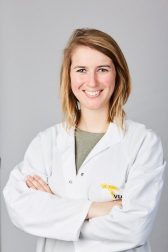
Hello everyone! I’m very pleased for this wonderful opportunity to introduce myself. I’m Amorn Slosse, 29 years old and born in Kortrijk, Belgium. In 2016, I graduated from the Vrije Universiteit Brussel (VUB) as a master in pharmaceutical sciences with a specific interest in pharmaceutical care. I always wanted to work as a scientist. My first idea was to become a supervisor in a local pharmacy. However, at the end of my studies, a once-in-a-lifetime opportunity occurred. In that same year at the VUB, I started as a PhD student at the department of Analytical Chemistry, Applied Chemometrics and Molecular Modelling. In collaboration with the Toxicology & Drugs department at the National Institute of Criminalistics and Criminology (NICC), my research topic focuses on investigating cannabis by combining chromatography and multivariate data analysis. Since November 2019, I’m full-time engaged on the BorderSens project where I coordinate the NICC work packages. I assist in reporting the deliverables and in preparing the NICC-tasks, e.g. the validation of the BorderSens technology. Furthermore, I follow up the BorderSens administration such as the financial and periodical reports.

